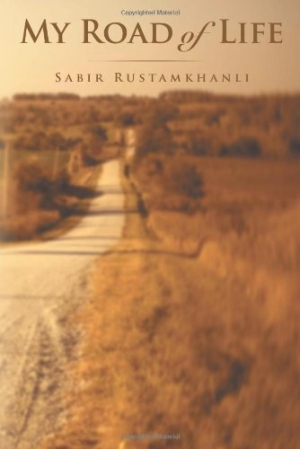My Road of Life
Poetry and prose lyrically meld the Azerbaijan landscape with the author’s own spiritual and political experiences.
In My Road of Life, Azerbaijani poet and politician Sabir Rustamkhanli contends that “each road has its own magic and its own story.” This English translation of his book describes the author’s own journey through life, including the magic and music he found traveling the roads, rivers, and railways of his homeland.
Rustamkhanli’s unnamed translator states that the book “is a mixture of fiction, history, ethnography, popular science.” Additionally, its twenty sometimes poetic, often passionate chapters refer to Azerbaijan’s geography; literature and literary personalities; politics; wars past and present; pictographs and spacemen; ancestors and heroes; monuments and museums; music and cuisine; and other topics.
As Rustamkhanli proudly identifies whatever makes each roadway, river, or region unique, such as the bread museum of Agdam, he sometimes rails against perceived injustices to Azerbaijanis. In the chapter “History Does Not Forgive Mistakes,” for example, he thanks God “that we have not been transported away like the oil, gas, iron, gold marble of our country.” His lyrical essay about the region’s pictographs, “Clever Rocks of Dalidag,” decries the loss of some of these artifacts to foreign museums. In “Clouds Originate from Seas,” Rustamkhanli has a playful imaginary monologue with the ancient philosopher Zoroaster.
In other chapters, the poet uses humor, irony, anger, anecdotes, and poetry (his own and that of others) to bolster his views about Azerbaijan and its citizens, accomplishments, constraints, and worldwide relations. While enthusiastically praising his countrymen for their resilience, he heatedly condemns the governments of Iran, Armenia, England, and the United States for what he believes are their betrayals.
My Road of Life is a difficult read for English speakers due largely to the faults in its translation. Numerous typos interrupt the flow and pace of the reading. Imaginative poetic images like the sight of Shusa’s “ocean of flowers” are offset by many muddled ones like “the holiday sweets on the trays with burning candles on them for the people there to have.”
The first half of the chapter “Clouds Originate from Seas” concerns roads and would therefore be better placed in the preceding chapter, “Roads … Roads,” itself a lengthy but enlightening description of the network of Azerbaijan’s pathways. Rustamkhanli says, “Like the strings of my native saz,” these roads “each … produce a different melody.” The ideally chosen cover-art image could easily be one of these roads.
The translator admits to his or her difficulties by stating, “We have tried to give sense-for-sense translation to the poetry, not paying heed at its form, because to translate poetry and preserve the unity of the form and content not very often gain a success.” Regrettably, this lack of success carries over, as well, into much of the prose.
Still, in Rustamkhanli’s book, one of the more than sixteen he has published, patient readers can discover a unique magic and music, many interesting stories, and an excess of revelations from an influential Azerbaijani poet-politician who lives and travels his motherland, which lies “in one of the first and most ancient cradles of civilization.”
Reviewed by
Wayne Cunningham
Disclosure: This article is not an endorsement, but a review. The publisher of this book provided free copies of the book and paid a small fee to have their book reviewed by a professional reviewer. Foreword Reviews and Clarion Reviews make no guarantee that the publisher will receive a positive review. Foreword Magazine, Inc. is disclosing this in accordance with the Federal Trade Commission’s 16 CFR, Part 255.

